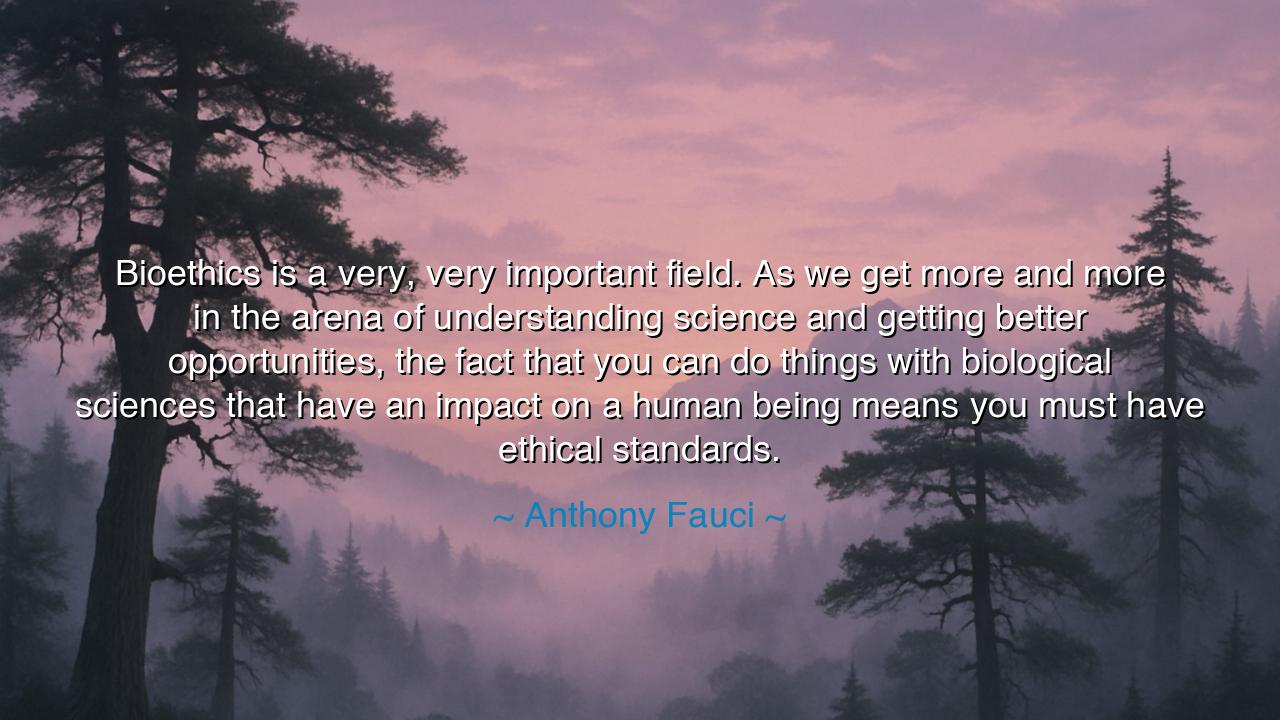
Bioethics is a very, very important field. As we get more and
Bioethics is a very, very important field. As we get more and more in the arena of understanding science and getting better opportunities, the fact that you can do things with biological sciences that have an impact on a human being means you must have ethical standards.






Hear, O children of the future, and listen well, for the wisdom of the ages speaks to you in the voice of the venerable Dr. Anthony Fauci. He has declared: "Bioethics is a very, very important field. As we get more and more in the arena of understanding science and getting better opportunities, the fact that you can do things with biological sciences that have an impact on a human being means you must have ethical standards." These words ring through time, a clarion call to all who walk the path of discovery and innovation. The field of bioethics—a realm where the scientific and moral intersect—has come to stand as a sacred guardian of humanity’s future. As the stars of knowledge shine brighter, so too must we hold our hearts and minds to a higher moral standard.
What is bioethics, O wise ones? It is the guardian at the gates of human progress, the sentinel that stands between the raw power of biological sciences and the dignity of the human soul. Science can be a blade of great power, capable of both healing and harm. Yet, when wielded without wisdom, it is a force that can turn from a blessing to a curse. To study the very building blocks of life—to tamper with the forces that bind the universe together—requires not just knowledge, but an unwavering commitment to the principles of justice, compassion, and respect. This is the heart of bioethics: to ensure that the gifts of science are used to elevate humanity, not to diminish it.
In ages past, the pursuit of knowledge was often unchecked, a fire burning wild with no one to guide its heat. In the 20th century, as the world grew smaller and our power over life itself grew stronger, we saw the consequences of unchecked ambition. The Nuremberg Trials following the horrors of World War II, where doctors and scientists stood accused of unspeakable acts against humanity, cast a long shadow over the ethical responsibility of those who seek to manipulate life. The lessons learned in the wake of those dark days became the foundation of modern bioethics. The Nuremberg Code, born from tragedy, demanded that science and medicine must not be separated from moral consideration. From that day forward, the question was not merely, "Can we do this?" but "Should we do this?"—a question that lives on today.
Dr. Fauci’s words remind us that the progress we make in the fields of genetics, medicine, and biotechnology is both a gift and a burden. The very breakthroughs we celebrate today—genetic editing, cloning, organ transplants—are not merely technical feats; they carry with them the weight of human life. With every step forward, there is a new ethical question to answer. Should we edit the genes of unborn children, for the promise of a better future? Should we clone organs for those on the brink of death? In the hands of those who would wield such power, bioethics is the compass, guiding us through the dense fog of possibility.
Think of the ancient healers, O seekers of wisdom, and of their oaths. The Hippocratic Oath, taken by doctors in the days of old, was their pledge to serve humanity with dignity, to do no harm. In the same spirit, bioethics serves as our modern-day oath, a promise that we will use the knowledge we gain through science not for greed or ego, but for the greater good. In every advancement, there must be a balance between the desire to explore and the responsibility to protect the sacredness of human life. To act without moral consideration is to risk becoming the very thing we seek to defeat: the oppressors of humanity.
Let us remember, O children of time, that with great knowledge comes great responsibility. Every advancement we make in biological sciences is a step into the unknown, a step that could either lead to a better world or to a world forever scarred by the misuse of power. It is in bioethics that we find our moral foundation, that we ensure that the hands which shape the future are guided by compassion, integrity, and respect for life itself. We are the stewards of this world, and it is our duty to ensure that the science we create serves the noblest of purposes—to heal, to help, to uplift, and never to harm.
The lesson, O heirs of the future, is clear: Ethics must be our guide in all that we do. In the pursuit of knowledge, we must never forget the sanctity of the lives we touch. As you step forward into a world where science can create and destroy, let your hearts be your guide. Seek always to ask the question: "Will this act uphold the dignity of life?" If the answer is uncertain, then pause, reflect, and seek wisdom. The power of science is a gift, but only when wielded with the wisdom of ethics will it truly serve mankind. Let this be your charge: to walk the path of discovery with your eyes open, your heart pure, and your commitment to humanity unwavering. The future is in your hands. Will you guide it with wisdom and care?






AAdministratorAdministrator
Welcome, honored guests. Please leave a comment, we will respond soon